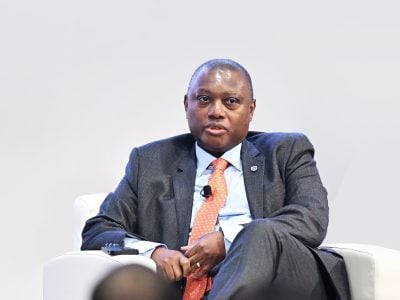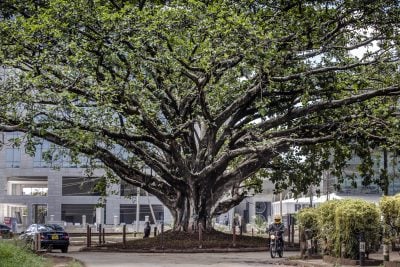The challenge for multilateral development banks (MDBs) in mitigating the disruptive impacts on their member countries in a post-Covid landscape is either to innovate or stagnate. This is particularly true for their operations and sources of funding.
The 57-member Jeddah-based Islamic Development Bank (IsDB) is adept at innovating given the devastation the pandemic has wreaked on its member countries.
The IsDB, the second largest MDB after the World Bank in terms of capital and unique in that its operations are compliant with Islamic financial principles, is targeting food security and agriculture, and climate-related disruption in its 27 African member countries.
Agriculture is the most important sector in IsDB member countries, contributing a total of $650bn to GDP annually.
Dr Bandar Hajjar, President of the IsDB, addressing a recent virtual dialogue with 13 African heads of government, confirmed that the bank is investing $3.5bn in developing the agriculture sector in Africa.
The aim is to develop commodity value chains for both staple food and cash crops; to improve technical efficiencies and productivity and connect local value chains to global ones.
“For our member countries to be ready for future challenges, our new business model concentrates on leveraging global value chains. It analyses the most competitive industries, identifies strategic investment opportunities, and builds resilient value chains to unlock their full potential,” he stated.
In agribusiness, this includes increasing water use efficiency and productivity via affordable low-tech innovations; developing climate-resilient high-yield plants with enhanced nutrition that lower production costs; and enhancing commercial farming.
Supporting agricultural value chains
The bank recently launched a regional rice value chains programme in partnership with the African Development Bank (AfDB) and the Arab Bank for Economic Development in Africa (BADEA) to support five West African countries in achieving rice self-sufficiency by 2025. The IsDB is investing $180m to support the programme.
“We will continue to support our 27 African member countries in developing and financing competitive commodity value chains along with appropriate tools to de-risk value chain investments,” explained Dr Hajjar.
The IsDB has already invested $3.5bn through its Strategic Preparedness and Response Programme (SPRP) to support pandemic health, food emergencies and recovery programmes in its member countries.
Dr Hajjar and Dr Sidi Ould Tah, CEO of BADEA, signed a co-financing agreement in June to boost projects in common member countries over the next four years.
The IsDB, being one of the world’s most proactive issuers of sukuk (Islamic bonds), is keen to leverage sukuk in financing infrastructure and through export credit and investment insurance and guarantees.
Over the past 10 years, the two institutions have co-financed 12 projects in Côte d’Ivoire, Guinea, Gambia, Sierra Leone, Mali, Senegal, Chad, Niger and Mozambique in several sectors. Other IsDB Group entities are also co-opted. The Islamic Corporation for the Insurance of Investment and Export Credit (ICIEC), for example, provided $50m in insurance cover through its Bank Master Policy (BMP) in May.
This is to support BADEA’s participation in a syndication with the International Islamic Trade Finance Corporation (ITFC), the trade fund of the IsDB Group, and BMCE Bank of Africa.
The syndication is to provide financing to the ECOWAS Bank for Investment and Development (EBID). The financing will facilitate the import of strategic goods from Arab countries to member states of ECOWAS (the Economic Community of West African States). This transaction marks the first Islamic BMP signed between ICIEC and an MDB.
“ICIEC and BADEA’s involvement,” confirms Oussama Kaissi, CEO of ICIEC, “has increased the availability of financing to EBID to not only facilitate the importation of strategic goods to ECOWAS countries but also support the business and growth of Arab exporters.”
The IsDB has also established a $500m co-financing facility with the International Fund for Agricultural Development (IFAD) to tackle climate change, improving food and water security in member countries.
Each institution is contributing $250m to the facility, which covers the 2021-2025 period. The two institutions have a long history of cooperation going back to 1979, four years after the IsDB was founded.
“Food and water security,” explained Dr Hajjar, “are strategic priorities for member countries, most of which are in arid and semi-arid areas. Demographic growth and climate change are increasing the pressure on these vital resources.
“The partnership will allow us to co-create financing and investment programmes that will address these challenges but also help our member countries tap into emerging global value chain opportunities to build resilience in a post-Covid world.”
According to Gilbert F. Houngbo, President of IFAD and ex-Premier of Togo, the two institutions would cooperate in agricultural and rural development, agribusiness, value chains development, improved access to markets, rural financial services and employment opportunities.
“Both institutions strive to improve the lives of the world’s most vulnerable people and contribute to ending poverty. We can strengthen our impact in areas of common interests, increasing climate resilience and using technology and innovation to maximise impact,” he added.
Cotton is attracting increasing global attention, including from new WTO Director-General Ngozi Okonjo-Iweala, as the sector gears up for World Cotton Day in October. The WTO has just launched a dedicated Cotton Data Hub on its website.
According to the International Cotton Advisory Committee (ICAC), cotton production and consumption are expected to increase in 2021/22, with production in West Africa expected to reach 1.5m tonnes, representing 38% growth. Africa, says ICAC, has lagged behind in adopting new technologies, especially for small cotton farmers.
The IsDB Group has been a strong supporter of the African cotton sector. The ITFC, for example, recently signed a $750m three-year Framework Agreement with Cameroon whereby ITFC will provide $250m annual financing to support key sectors through integrated trade finance solutions and lines of credit to local banks to support SMEs.
The ITFC also extended an €98m Murabahah financing facility to the state cotton company, Société de Développement du Coton, to purchase vital agricultural inputs including pesticides, herbicides, cotton seed and soybeans.
LIBOR being phased out
The main structural change looming for MDBs and international finance is the phasing out of the London Interbank Offered Rate (LIBOR), the traditional benchmark for international financing. This was supposed to be at end 2021 but has been extended to June 2023.
LIBOR will be replaced by the Secured Overnight Financing Rate (SOFR), a broad measure of the cost of borrowing cash overnight, collateralised by US Treasury securities.
The IsDB is leading the way in this transition period, issuing a maiden three-year $400m SOFR-linked sukuk in June 2021 as it continues to expand its fundraising universe. Benchmarks are important because they impact pricing and therefore the cost of finance. The IsDB issuance is the first in the sukuk market.
“The global shift away from LIBOR,” explains the IsDB’s Dr Hajjar, “will undoubtedly have an impact on IsDB operations in our member countries. We do anticipate further SOFR-linked sukuk issuances in order to build IsDB’s SOFR-linked curve.
“We will also continue our efforts for other risk-free rate issuances soon. We intend to continue this momentum in order to secure low-cost funding, strengthen our standing in a new market reality and keep promoting sukuk as an alternative asset class for sustainable development.”
Want to continue reading? Subscribe today.
You've read all your free articles for this month! Subscribe now to enjoy full access to our content.
Digital Monthly
£8.00 / month
Receive full unlimited access to our articles, opinions, podcasts and more.
Digital Yearly
£70.00 / year
Our best value offer - save £26 and gain access to all of our digital content for an entire year!
 Sign in with Google
Sign in with Google 



